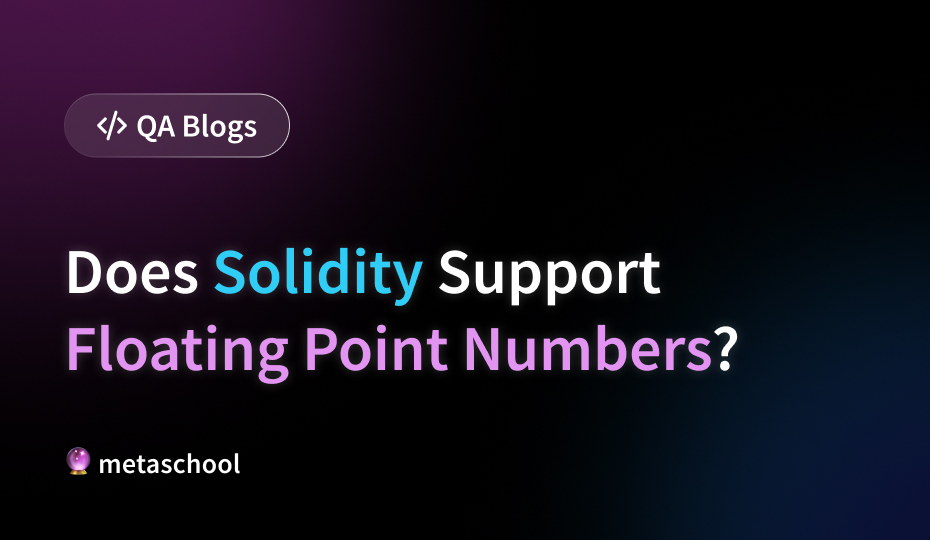Does Solidity Support Floating Point Numbers?
Learn why Solidity doesn't natively support floating-point numbers and discover alternative solutions for handling decimals in your smart contracts.
Learn why Solidity doesn't natively support floating-point numbers and discover alternative solutions for handling decimals in your smart contracts.
Solidity, the programming language for Ethereum smart contracts, prioritizes deterministic behavior, ensuring that computations yield identical results across all nodes in the network. This emphasis on determinism stems from the need for consensus among distributed systems. However, this design choice comes with a trade-off: Solidity does not directly support floating-point numbers. Floating-point arithmetic, while common in traditional programming, can introduce subtle variations in results due to differences in hardware architectures or software implementations. Instead, Solidity developers must employ alternative strategies to represent and manipulate decimal values.
Solidity doesn't directly support floating-point numbers like 1.23 or 3.14. This is because blockchains need to guarantee the same result for a calculation on every computer running it. Floating-point math, due to its complexity, can lead to tiny variations in results across different systems.
Here's how to handle situations where you might want to use decimals:
Use Integers with Scaling:
1.23 becomes 123, 12.50 becomes 1250, and so on.uint256 price = 123; // Represents 1.23Fixed-Point Math Libraries:
ABDKMathQuad provide functions for more complex calculations involving decimals.uint256 a = ABDKMath64x64.divu(1 ether, 2); // Divides 1 ether by 2Important Considerations:
In essence, while Solidity doesn't have built-in floating-point numbers, you can achieve similar results using integers, scaling, and specialized libraries.
This code showcases two ways to handle decimals in Solidity. The first method uses integers with scaling, where a scaling factor is applied to represent decimal values. The second method utilizes the ABDKMath64x64 library for precise decimal calculations. The code provides examples of both methods and highlights important considerations for working with decimals in Solidity.
This code demonstrates the two main methods of handling decimals in Solidity:
1. Integer with Scaling:
pragma solidity ^0.8.0;
contract DecimalExample {
// Price in wei, scaled by 10^2 (2 decimal places)
uint256 public price = 123; // Represents 1.23
function getPriceInWei() public view returns (uint256) {
return price;
}
function getPriceWithDecimals() public view returns (uint256) {
// Divide by 10^2 to get the price with decimals
return price / 100;
}
}2. Using ABDKMath64x64 Library:
pragma solidity ^0.8.0;
import "https://github.com/abdk-consulting/abdk-libraries-solidity/blob/master/ABDKMath64x64.sol";
contract DecimalLibraryExample {
function divideEther() public pure returns (int128) {
// Divide 1 ether by 2 using the library
return ABDKMath64x64.divu(1 ether, 2);
}
}Explanation:
123, representing 1.23 with a scaling factor of 100.
getPriceInWei() returns the raw scaled value.getPriceWithDecimals() divides by the scaling factor to present the decimal value.divu function from the library to divide 1 ether by 2, handling the decimal precision internally.Important Notes:
This example provides a starting point for working with decimals in Solidity. Always prioritize security and accuracy when dealing with financial calculations.
Determinism is Key: The lack of native floating-point numbers in Solidity is a deliberate design choice to ensure that every calculation performed by a smart contract yields the exact same result on every node in the Ethereum network. This predictability is crucial for maintaining consensus and the integrity of the blockchain.
Scaling Factor Considerations:
Rounding Errors:
5 / 2 in Solidity will result in 2, not 2.5.Overflow and Underflow:
uint256). Performing arithmetic operations that exceed these limits can lead to overflow or underflow errors.Gas Efficiency:
Alternatives to Libraries:
Testing and Auditing:
Remember: Handling decimals in Solidity requires careful consideration of precision, rounding, overflow, and gas costs. Choose the approach that best balances these factors for your specific use case.
Solidity prioritizes deterministic calculations over floating-point precision. This means it doesn't directly support numbers like 1.23. Here's how to work with decimals in Solidity:
1. Integer Scaling:
1.23 becomes 123 (multiplied by 100).2. Fixed-Point Math Libraries:
ABDKMathQuad offer functions for complex calculations involving decimals.Key Considerations:
In conclusion, while Solidity lacks native floating-point numbers, you can effectively work with decimals using integer scaling and specialized libraries.
In conclusion, Solidity's design prioritizes determinism and security in blockchain computations, leading to the absence of native floating-point numbers. Developers must adopt alternative approaches like integer scaling and fixed-point math libraries to handle decimals effectively. While these methods introduce challenges such as precision loss, rounding errors, and increased gas costs, they provide viable solutions for representing and manipulating decimal values in smart contracts. By understanding the trade-offs and employing best practices, developers can ensure the accuracy, reliability, and security of their decentralized applications.
 Does Solidity Support Floating Point Numbers? - | Metaschool | Solidity doesn't natively support floating point numbers. We will learn the alternative ways to use floating point numbers in Solidity.
Does Solidity Support Floating Point Numbers? - | Metaschool | Solidity doesn't natively support floating point numbers. We will learn the alternative ways to use floating point numbers in Solidity. Types — Solidity 0.8.29 documentation | Fixed point numbers are not fully supported by Solidity yet. They ... Generally, in floating point almost the entire space is used to represent the number ...
Types — Solidity 0.8.29 documentation | Fixed point numbers are not fully supported by Solidity yet. They ... Generally, in floating point almost the entire space is used to represent the number ... Simulating Floating Point Division in Solidity | by Sicong Zhao ... | Blockchain Development Tutorial 04
Simulating Floating Point Division in Solidity | by Sicong Zhao ... | Blockchain Development Tutorial 04 Fixed Point Arithmetic support - General - OpenZeppelin Forum | We've received multiple requests for a fixed point math library in OpenZeppelin (e.g. here). For those that are not familir with this concept, it basically boils down to scaling an integer so that a certain (fixed) number of decimals are included, e.g. a value of 100 would represent the number 1.00 if using two decimals, and multiplying 100 by 200 would yield 200 (1.00 * 2.00 = 2.00). This is particularly useful when dealing with decimals on systems that have no floating point support, but allow...
Fixed Point Arithmetic support - General - OpenZeppelin Forum | We've received multiple requests for a fixed point math library in OpenZeppelin (e.g. here). For those that are not familir with this concept, it basically boils down to scaling an integer so that a certain (fixed) number of decimals are included, e.g. a value of 100 would represent the number 1.00 if using two decimals, and multiplying 100 by 200 would yield 200 (1.00 * 2.00 = 2.00). This is particularly useful when dealing with decimals on systems that have no floating point support, but allow... Precision Loss in Solidity Operations | Discover the issues caused by the precision loss in smart contracts, and ways to prevent them.
Precision Loss in Solidity Operations | Discover the issues caused by the precision loss in smart contracts, and ways to prevent them. Math in Solidity (Part 1: Numbers) | by Mikhail Vladimirov ... | This article opens a series of articles about doing math in Solidity. The first topic to discuss is: numbers.
Math in Solidity (Part 1: Numbers) | by Mikhail Vladimirov ... | This article opens a series of articles about doing math in Solidity. The first topic to discuss is: numbers.